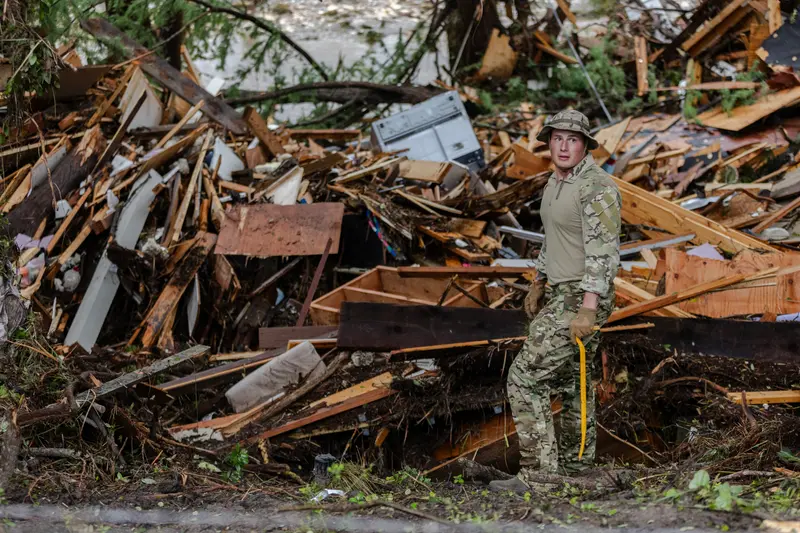Nine months ago, Hurricane Helene barreled up from the Gulf of Mexico and slammed into the rugged mountains of western North Carolina, dumping a foot of rain onto an already saturated landscape. More than 100 people died, most by drowning in floodwaters or being crushed by water-fueled landslides.
“We had no idea it was going to do what it did,” said Jeff Howell, the now-retired emergency manager in Yancey County, North Carolina, a rural expanse that suffered the most deaths per capita.
A week ago, the remnants of Tropical Storm Barry slipped up from the coast of Mexico, drawing moisture from the Gulf, then collided with another system and inundated rivers and creeks in hilly south central Texas. More than 100 people are confirmed dead, many of them children, with more missing.
“We had no reason to believe that this was going to be anything like what’s happened here — none whatsoever,” said County Judge Rob Kelly, the top elected official in Kerr County, Texas, where most of the deaths occurred.
The similarities between North Carolina and Texas extend beyond the words of these two officials. In both disasters, there was a disconnect between accurate weather alerts and on-the-ground action that could have saved lives.
Officials in each of those places were warned. The National Weather Service sent urgent alerts about potentially life-threatening danger hours in advance of the flash floods, leaving time to notify and try to evacuate people in harm’s way.
In Texas, some local officials did just that. But others did not.
Similarly, a ProPublica investigation found that when Helene hit on Sept. 27, some local officials in North Carolina issued evacuation orders. At least five counties in Helene’s path, including Yancey, did not. Howell said the enormity of the storm was far worse than anyone alive had ever seen and that he notified residents as best he could.
The National Weather Service described Helene’s approach for days. It sent out increasingly dire alerts warning of dangerous flash flooding and landslides. Its staff spoke directly with local emergency managers and held webinar updates. A Facebook message the regional office posted around 1 p.m. the day before Helene hit warned of “significant to catastrophic, life-threatening flooding” in the mountains. “This will be one of the most significant weather events to happen in the western portions of the area in the modern era.”
Similarly, in Texas, the weather service warned of potential for flash flooding the day before. Also that day, the state emergency management agency’s regional director had “personally contacted” county judges, mayors and others “in that area and notified them all of potential flooding,” Lt. Gov. Dan Patrick later said at a press conference.
AccuWeather, a commercial weather forecasting service, issued the first flash flood warnings for the area at 12:44 a.m. on July 4, roughly three hours before the catastrophic flooding. A half-hour later, at 1:14 a.m., the National Weather Service sent a similar warning to two specific areas, including central Kerr County, where the Guadalupe River’s banks and hills are dotted with vacation homes, summer camps and campgrounds — many filled with July 4 vacationers slumbering in cabins and RVs.
“Flash flooding is ongoing or expected to begin shortly,” the weather service alert said. Impacts could include “life threatening flash flooding of creeks and streams.”
A severity descriptor on that alert sent it to weather radios and the nation’s Wireless Emergency Alerts system, which blasts weather warnings to cellphones to blare an alarm.
AccuWeather’s chief meteorologist, Jonathan Porter, was dismayed to hear news later that all the children attending youth camps in Kerr County had not been ushered to higher ground despite those warnings.
At Camp Mystic, a beloved century-old Christian summer camp for girls, at least 27 campers and counselors were killed. Six still haven’t been found. Its director also died, while trying to rescue children. (People at the camp said they received little to no help from the authorities, according to The New York Times.)
“I was very concerned to see that campers were awoken not by someone coming to tell them to evacuate based on timely warnings issued but rather by rapidly rising water that was going up to the second level of their bunkbeds,” Porter said.
In the area, known as Flash Flood Alley, Porter called this “a tragedy of the worst sort” because it appeared camps and local officials could have mobilized sooner in response to the alerts.
“There was plenty of time to evacuate people to higher ground,” Porter said. “The question is, Why did that not happen?”
But Dalton Rice, city manager of Kerrville, the county seat, said at a press conference the next day that “there wasn’t a lot of time” to communicate the risk to camps because the floodwaters rose so rapidly.
Rice said that at 3:30 a.m. — more than two hours after the flash flood warnings began — he went jogging near the Guadalupe River to check it out but didn’t see anything concerning.
But 13 miles upriver from the park where he was jogging, the river began — at 3:10 a.m. — to rise 25 feet in just two hours.
At 4:03 a.m., the weather service upgraded the warning to an “emergency”— its most severe flash flood alert — with a tag of “catastrophic.” It singled out the Guadalupe River at Hunt in Kerr County: “This is a PARTICULARLY DANGEROUS SITUATION. SEEK HIGHER GROUND NOW!”
The local sheriff said he wasn’t made aware of the flooding until 4 to 5 a.m. He has declined to say whether the local emergency manager, who is responsible for alerting the public to approaching storms, was awake when the flash flood warnings went out starting at 1 a.m. The Texas Tribune reported that Kerrville’s mayor said he wasn’t aware of the flooding until around 5:30 a.m., when the city manager called and woke him up.
Local officials have refused to provide more details, saying they are focused on finding the more than 100 people still missing and notifying loved ones of deaths.


Credit:
First image: Sean Rayford/Getty Images. Second image: Jim Vondruska/Getty Images
One challenge as disasters approach is that weather alerts often don’t reach the people in harm’s way.
In rural areas across Texas and North Carolina alike, cellphone service can be spotty on the best of days, and some people turn off alert notifications. In North Carolina’s remote mountains, many people live at least somewhat off the grid. The cell service isn’t great everywhere, and many aren’t glued to phones or social media. In Texas, Kerr County residents posted on Facebook complaints that they didn’t receive the weather service’s alerts while others said their phones blared all night with warnings.
Many counties also use apps to send their own alerts, often tailored to their specific rivers and roads. But residents must opt in to receive them. Kerr County uses CodeRed, but it isn’t clear what alerts it sent out overnight.
Pete Jensen has spent a long career in emergency management, including responding to the Sept. 11, 2001, terrorist attack. He served as an official at the Federal Emergency Management Agency during Hurricane Katrina and often ponders why more people don’t receive – and heed – weather alerts.
“There’s an awful lot of denial,” Jensen said. “Disasters happen to someone else. They don’t happen to me.” That can include local officials who “don’t always understand what their responsibilities are. They very often react like most humans do – in denial.”
There is one big difference between the disasters in Texas and North Carolina. In Texas, residents, journalists and others have demanded accountability from local officials. Gov. Greg Abbott has called the Legislature into special session starting July 21 to discuss flood warning systems, flood emergency communications and natural disaster preparation.
But that hasn’t happened in North Carolina. The state legislature has yet to discuss possible changes, such as expanding its Know Your Zone evacuation plan beyond the coast, or boost funding for local emergency managers. (Instead, lawmakers went home in late June without passing a full budget.) Many emergency managers, including in Yancey County, operate in rural areas with small tax bases and skeleton staffs.
“There still has not been an outcry here for, How do we do things differently?” said state Sen. Julie Mayfield, a Democrat from Asheville. “It still feels like we’re very much in recovery mode.”
North Carolina’s emergency management agency commissioned a review of its handling of the disaster. The report found the state agency severely understaffed, but it didn’t examine issues such as evacuations or local emergency managers’ actions before Helene hit.
Erika Andresen also lives in Asheville, a mountain city in the heart of Helene’s destruction, where she helps businesses prepare for disasters. A lawyer and former Army judge advocate, she also teaches emergency management. After Helene, she was among the few voices in North Carolina criticizing the lack of evacuations and other inactions ahead of the storm.
“I knew right away, both from my instinct and from my experience, that a lot of things went terribly wrong,” Andresen said. When she got pushback against criticizing local authorities in a time of crisis, she countered, “We need accountability.”

